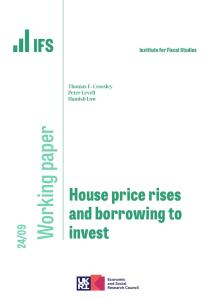The saving patterns of retired US households pose a challenge to the basic life-cycle model of saving. The observed patterns of out-of-pocket medical expenses, which rise quickly with age and income during retirement, and heterogeneous life span risk can explain a significant portion of US saving during retirement. However, more work is needed to distinguish these precautionary saving motives from other motives, such as the desire to leave bequests. Progress toward disentangling these motivations has been made by matching other features of the data, such as public and private insurance choices. An improved understanding of whether intended bequests left to children and spouses are due to altruism, risk sharing, exchange motivations, or a combination of these factors is an important direction for future research.
Authors

CPP Co-Director
Eric is the Montague Burton Professor of Industrial Relations and Labour Economics at the University of Cambridge and Professor of Economics at UCL.

Research Fellow University of Minnesota and Federal Reserve Bank of Minneapolis
Mariacristina is an Research Fellow at the IFS and also a Professor in the Economics Department at the University of Minnesota.

John Bailey Jones
Journal article details
- Publisher
- NBER
- Issue
- October 2016
Suggested citation
J, Bailey Jones and M, De Nardi and E, French. (2016). 'Savings after retirement: a survey' (2016)
More from IFS
Understand this issue

The future of the state pension
21 December 2023

What does the Conservative's 'triple lock plus' announcement mean? And what's the context around tax and the state pension?
30 May 2024

Should we abolish the triple lock?
18 December 2023
Policy analysis

Pensions: five key decisions for the next government
7 June 2024

Key decisions await the pensions minister after the election
7 June 2024

How do the last five years measure up on levelling up?
19 June 2024
Academic research

House price rises and borrowing to invest
27 March 2024

The impact of labour demand shocks when occupational labour supplies are heterogeneous
28 June 2024

Labour market inequality and the changing life cycle profile of male and female wages
15 April 2024